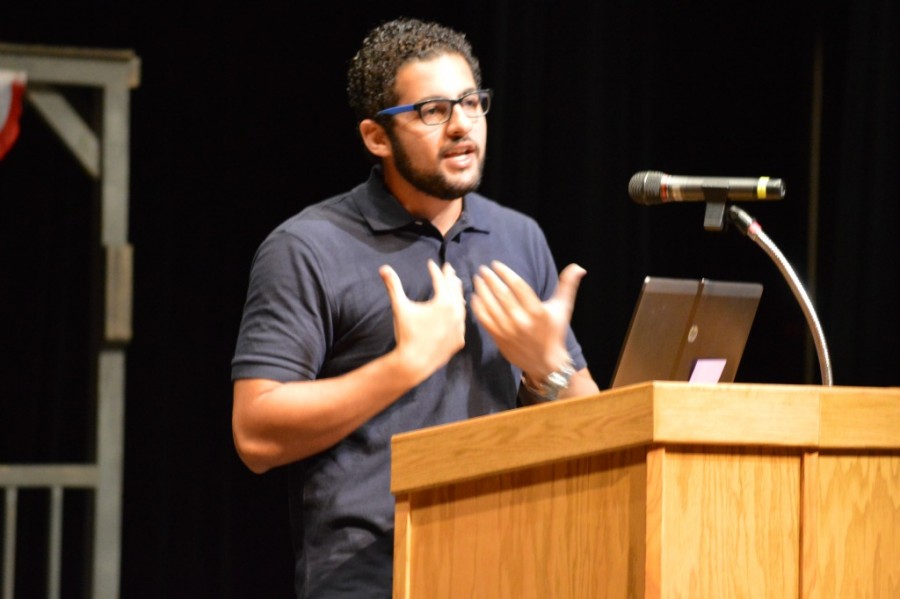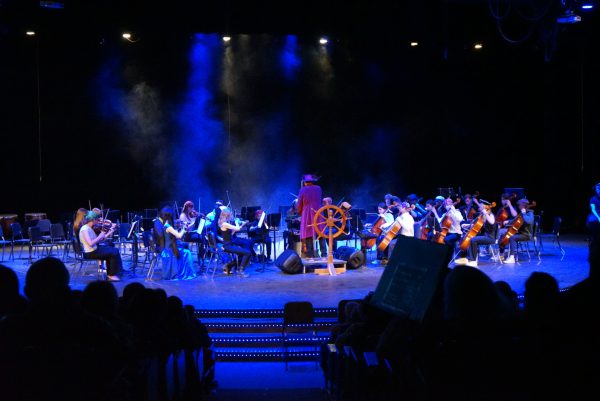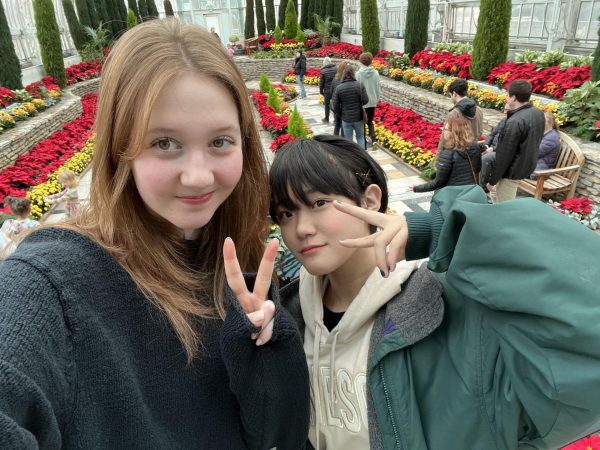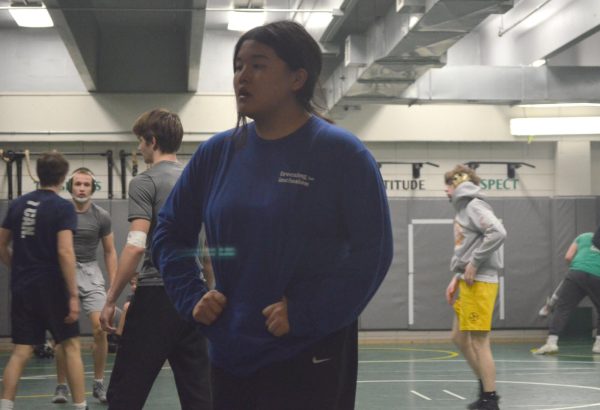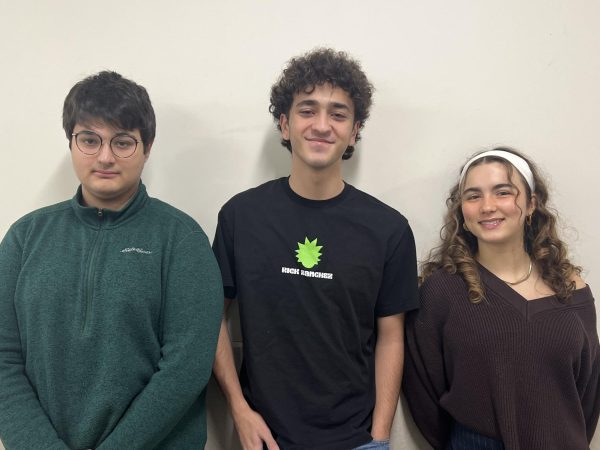Political Refugee Comes and Speaks at EHS
Read about Hussein Aboubakr’s story
Hussein Aboubakr speaking during Collaborative Time last thursday
October 10, 2015
As children, we all are introduced to a narrative that helps us understand who we are. The story that we are told often has nationalistic and religious elements. Political refugee Hussein Aboubakr came to speak at Edina High School of his battle with the narrative that was forced upon him as a child.
Aboubakr was born in 1989 in Cairo, Egypt to a middle-class radical Islamic family. As a child, Aboubakr was taught that Arabs were superior to everybody else because God said so. Opposite from their super-nation, there were the bad guys: U.S.A. and the “infidel West”. Within this narrative ingrained in Arab culture were the supervillains, the incarnations of evil who are capable of destroying everything that is good: the Jews.
“For me, as this good person I [had] to partake in this eternal battle between the powers of goodness and the powers of evil. This is a very strong narrative especially for young people, for kids, and for children. This is a very fascinating story; it is a mix of mythology, religious fascination, conspiracy theory giving you this very powerful story that fascinates too many people, ” said Aboubakr. You don’t even need to read Arabic to notice the anti-semitic propaganda in the Middle East; it’s everywhere. Every Friday, Aboubakr would go to mosque, and a part of the prayer will be specifically for the death of Jews. As a normal kid in Arabic culture, Aboubakr felt no reason to object to this widely accepted narrative.
As a kid, Aboubakr admits he was a nerd and became interested in educating himself about this fight of good versus evil. To best “decode the evil plans of the Jews,” Aboubakr thought that he should first learn the Hebrew language. Although, back then, the internet was not as big in other languages, so to understand the resources he came across Aboubakr taught himself English. He began to analyze historical texts written from different perspectives, and realized that history began to make much more sense than the narrative that he was taught. “What is a Jew? A Jew is not a supervillain. A Jew is . . . actually a normal human being,” said Aboubakr.
By this point in his life, Aboubakr was in a crisis. He didn’t know what to believe from his religion, his schooling, or any Arab authority figures in his life. One day, as he was reading “1984” by George Orwell, Aboubakr read a sentence that made a monumental difference to him going forward: “Even if you are a minority of one it does not make you wrong.”
After Aboubakr finished high school, his family desired him to go into the family business and study banking, but instead, Aboubakr decided to study languages. His parents were not happy about his change of study, but unfortunately, they were busy with a divorce, so they gave him relative privacy.
Aboubakr now had something to say, so he started a blog where he wrote about the Christian persecution as well as the women’s’ rights violations in the Middle East. As Aboubakr went further into his Israeli studies, he yearned to read primary sources from Israel, but there were none in Egypt except for one lone Israeli Academic Center. After he borrowed some books, Aboubakr was stopped by a state security officer who questioned him. Three days later, he was called by state security who had discovered his blog and demanded that he stop studying Hebrew. Aboubakr was shocked, and blogged about the ordeal. His story eventually ended up on the front page of an Israeli newspaper. As a result, state security came to his house, and took him and his father into interrogation. Aboubakr’s father promised that his son would stop.
Aboubakr’s family couldn’t understand why he had turned away from the religion and their relationship deteriorated. “I couldn’t live in a society where a lot of people were unhappy. I was actually a male middle-class Sunni muslim. I was part of the dominant group in the Middle East . . . [But] I am much better off living in a place where all people are all happy and equal than in a place where I have a higher status than others,” said Aboubakr.
Getting arrested was becoming a routine for Aboubakr as he continued to blog, but he didn’t mind because there was no physical pain involved. Until, as a male Egyptian, Aboubakr was required to enlist in mandatory military service. In the process of enlisting, Aboubakr’s criminal history was noticed, so he was sent to a military prison where he underwent horrendous torture. “They would call me zionist pig, Jew lover. . . It was the worst time of my life. I wish I died every day,” said Aboubakr. After three months, they relieved him of his military duty because he “was a threat to Egyptian society.”
Aboubakr was crushed and broken until one month later, something happened that healed him instantly. “All of a sudden, I see the people rising against the same government that jailed me, tortured me, tried to steal my intellectual freedom, my academic freedom, tried to ruin my life, tried to ruin everything I want to do,” said Aboubakr. He was able to join a revolution and spent nights and days in Tahrir Square protesting. Ten days later the president went away, and everybody was hopeful for a new future. But two months later, bit by bit, the muslim brotherhood started to control government. The revolution was ultimately unsuccessful, so Aboubakr could not stay.
By the end of 2011, Aboubakr fled by hiding in Christian monasteries in the Western desert. He came to the United States as an asylum seeker in 2012. “Despite everything they all did to stop me, they couldn’t stop me,” said Aboubakr. He is currently living out his passion teaching Hebrew and Jewish culture at the Defense Language Institute in Monterey, California. “The story of Israel is not the story of a country. The story of Israel is one of the most ancient minorities in human history. . . The majority of the middle East is dominated by bad ideas. . . [The bad ideas] are causing them to persecute every minority whether it be Jews, Christian Iraqis, Christian Syrians, or Christian Egyptians. [Israel] needs support from every decent person against barbarity, against hatred, against racism, and against anti semitism,” said Aboubakr.
Aboubakr was speaking for the Stand With Us nonprofit.

